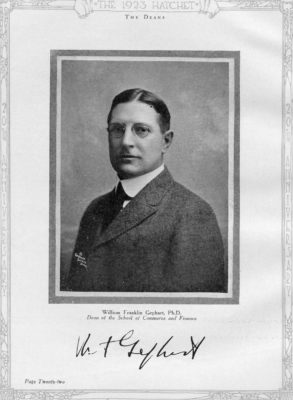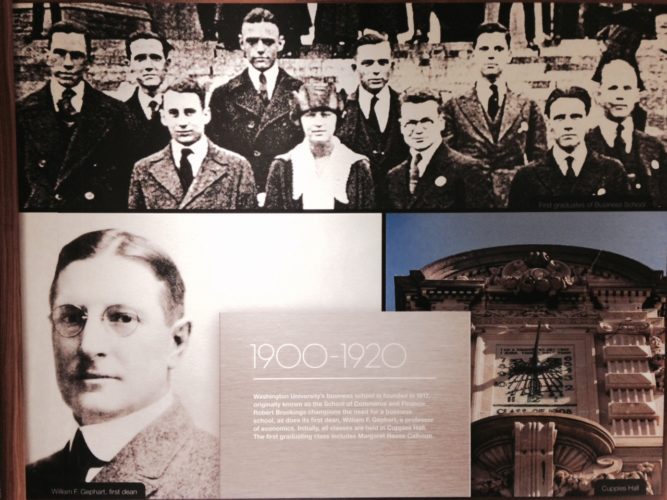One hundred years ago, the idea of a business school was not a high priority for most academic institutions. In fact, preparing students for careers in business was not considered as legitimate as earning a degree in medicine, law, engineering, or liberal arts. Trades, skills, and common business practices were something you learned as an apprentice, or literally on the job in the early 20th century.
 But an economics professor named William F. Gephart believed there was good reason to legitimize the study of finance and commerce, and it became his mission to open a business school at Washington University. Gephart was a native of Ohio who attended Ohio State University before he earned his PhD at Columbia University in 1909. He joined the WashU faculty in 1913 as head of the department of economics, political science, and sociology.
But an economics professor named William F. Gephart believed there was good reason to legitimize the study of finance and commerce, and it became his mission to open a business school at Washington University. Gephart was a native of Ohio who attended Ohio State University before he earned his PhD at Columbia University in 1909. He joined the WashU faculty in 1913 as head of the department of economics, political science, and sociology.
When Chancellor Frederic Aldin Hall and University President Robert S. Brookings asked Gephart for curriculum recommendations in 1914, he responded with a lengthy “Report on the Schools of Commerce.” By detailing the success of existing business schools (Wharton was established in 1881, the University of Chicago in 1895, Harvard in 1908), Gephart presented four main arguments in what became his personal campaign to create a business school.
- Research: “Business phenomena lend itself to scientific treatment and analytical study.”
- The growing need to teach theory and principles: “The man of 60 who has been a success in business cannot be taken as a model today,” Gephart wrote. “The old method of entering a business and learning from ‘the ground up’ [was] … no longer possible or desirable,” he maintained, for “industrial and commercial life had become too complicated and specialized.”
-
Competition: “The idea of training for business … commended itself to the leading educators of the United States” and “practically every leading university … either had established or was planning to establish such a business school.”
- Location: St. Louis was a thriving center for manufacturing and commerce. Gephart saw the local business community as a partner for training (what we call “experiential learning” today), and as future employers of business school graduates.
Gephart’s strongest selling point had to do with potential revenue. He reported to the Chancellor that, “when located in large cities, [business schools return] a surplus after the first two or three years, and in the thoroughly established schools the surplus was large.” In 1916 the University trustees granted approval for “a general scheme to establish a School of Administration … as soon as the necessary funds would be provided.”
Gephart was impatient. Armed with a $1,000 pledge and a letter of endorsement from Robert S. Brookings, he single-handedly raised the funds from 30 local businessmen and firms to open the newly named School of Commerce and Finance. Gephart served as the school’s first dean until 1921.
Visit Olin’s Centennial website for more business school history.
Tag your Olin memories on social media with: #Olin100
Photos courtesy of WashU Archives.



